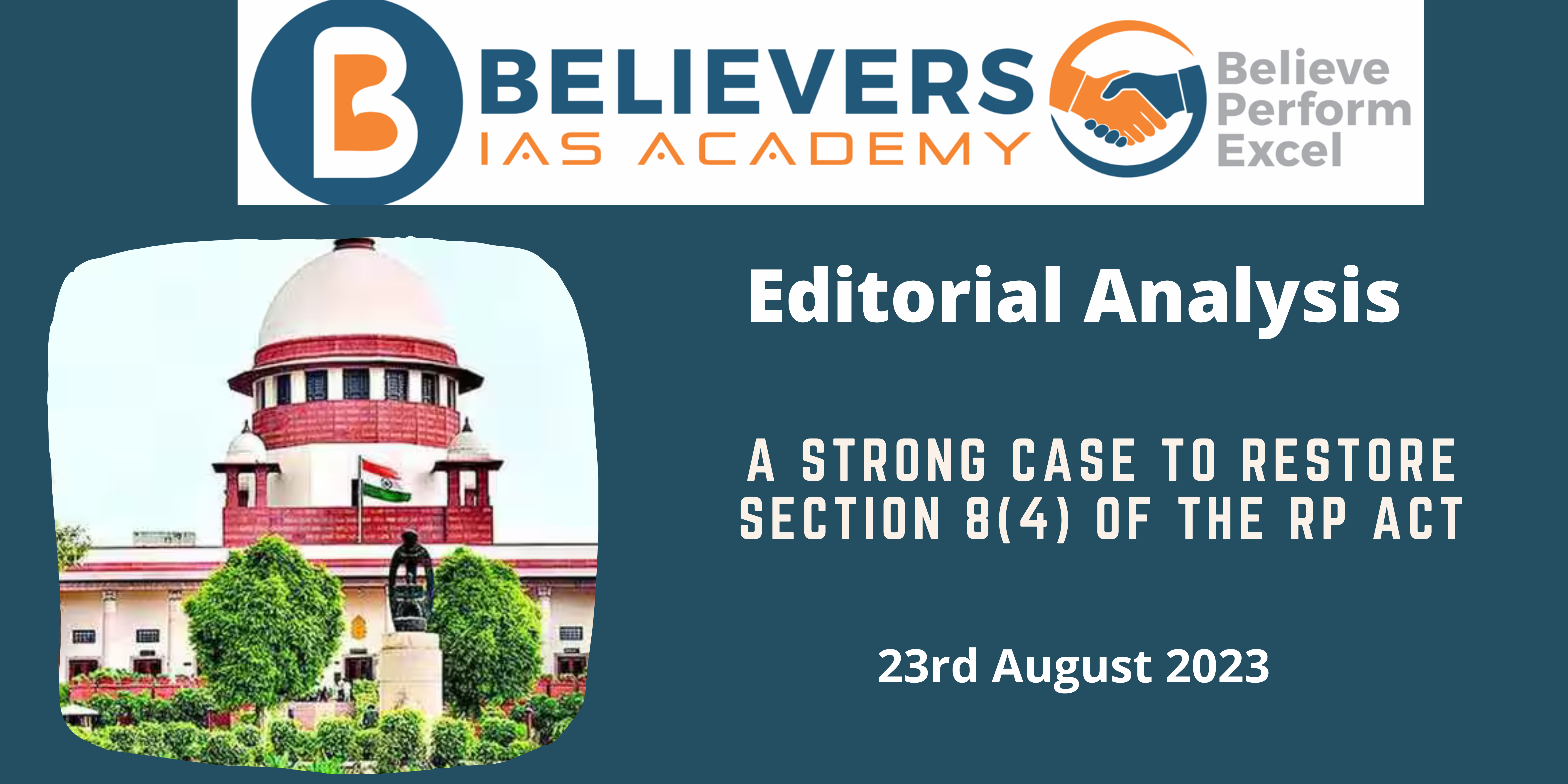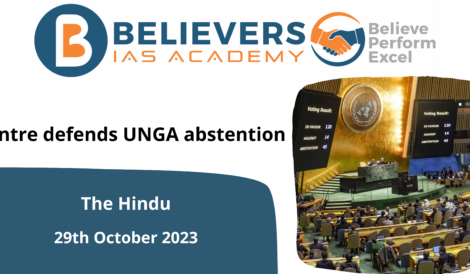A Strong Case to Restore Section 8(4) of the RP Act
Context:
The recent disqualification of Rahul Gandhi, a prominent member of the Congress party, has sparked discussions about the legal complexities surrounding disqualifications of legislators in India. This incident brings to light the interplay between legal provisions and judicial interpretations, raising questions about the instant nature of disqualifications and the potential impact on legislators’ careers.
Relevance:
GS – 02 (Representation of People’s Act, Constitutional Bodies)
Prelims:
- Representation of the People Act (RPA), 1950
- Article 102
Mains Question:
- Critically analyze the legal basis and implications of the instant disqualification of legislators in India, focusing on the recent case of Rahul Gandhi. 150 words.
Dimensions of the Article:
- Interpreting Disqualification
- Presidential Prerogative
- Sentence vs. Conviction
- Quantum of Sentence
- Balancing Careers and Consequences
- No Tangible Transformation
Interpreting Disqualification:
- The disqualification of Rahul Gandhi highlights the legal intricacies of the Representation of People Act 1951. The Supreme Court’s judgment in Lily Thomas vs Union of India (2013) played a pivotal role in reshaping the landscape of disqualifications.
- This verdict struck down Section 8(4) of the Act, which previously allowed a grace period for appeal before disqualification could take effect. As per experts’ opinions, this judgment altered the scenario, making instant disqualification plausible upon conviction under Section 8(3) of the Act.
- However, the veracity of the instant disqualification remains questionable due to the wording of the law itself. Section 8(3) stipulates that a person convicted and sentenced to at least two years’ imprisonment shall be disqualified, but it refrains from specifying whether disqualification is immediate upon conviction or subsequent to an official declaration. The ambiguity inherent in the language raises the essential query of whether disqualification truly occurs the moment a conviction is announced.
Presidential Prerogative:
- Amidst the legal perplexity, the role of the President under Article 103 emerges as a potential solution. While the Supreme Court rejected this proposition in Lily Thomas, the Consumer Education & Research vs Union Of India & Ors case (2009) endorsed the notion that a declaration by the President is vital to ascertain disqualification.
- This underscores the importance of clarifying the entity responsible for officially pronouncing the disqualification of a sitting legislator.
- Furthermore, Section 8(3) reveals a nuanced scheme: disqualification triggers upon conviction for a two-year or more imprisonment term, with the President wielding the power to enforce it under Article 103. Contrary to assumptions, the House’s Secretariat lacks the authority to declare immediate disqualification upon court conviction.
Sentence vs. Conviction:
- The perplexity extends to the question of whether a stay on sentence alone can lift disqualification or if a stay on conviction is also requisite. Historical court decisions further muddy the waters.
- While some High Courts advocated for the continuity of disqualification during a sentence stay, the Madras High Court proposed that suspending the sentence automatically suspends the conviction.
- The Supreme Court’s stance on this matter remains elusive, as it stayed Rahul Gandhi’s conviction without clarifying the interplay between sentence, conviction, and disqualification.
Quantum of Sentence:
- The intriguing connection between disqualification and sentence quantum demands attention. Notably, disqualification hinges on a minimum two-year imprisonment term.
- This criterion aligns with the recent observation in Rahul Gandhi’s case: a disqualification would not have transpired if the imprisonment were one day less. This underscores that disqualification’s occurrence is intricately tied to the length of the sentence, rather than the conviction itself. Policymakers and the judiciary must collectively address this intricate issue.
Balancing Careers and Consequences:
- The judgment in Lily Thomas accentuates the potential disruption to legislators’ careers due to instant disqualifications. The swift nature of convictions contrasts with the typically slow judicial processes, leaving little room for recourse.
- However, instances like the Agra court’s rapid stay on conviction for BJP MP Ram Shankar Katheria demonstrate exceptional cases where careers were safeguarded.
- The need for immediate attention to the instant disqualification matter is evident, given its potential impact on legislators’ trajectories. While Section 8(4) was invalidated for differentiation concerns, the Constitutional leeway in Article 103 could offer a solution.
- Amending Article 102 to allow for a restored Section 8(4) might strike the balance between ensuring legislators’ stability and upholding Constitutional principles.
No Tangible Transformation:
- Despite the legal shifts brought about by the Lily Thomas judgment, discernible changes in politicians’ conduct remain limited. Political figures aligned with the ruling party might secure swift stays on convictions, shielding themselves from instant disqualification.
- In contrast, others, like Rahul Gandhi, face prolonged legal battles to secure stays for minor cases. This disparity underscores the necessity of restoring and constitutionally safeguarding Section 8(4) to mitigate abrupt career disruptions stemming from hastily issued court orders.
Way Forward:
- To navigate the complexities of instant disqualification, legislative and judicial actions are imperative. Clarity must be established regarding the trigger for disqualification – whether it hinges on conviction or subsequent declaration.
- The role of the President as the authoritative figure for disqualification should be reinforced, considering the precedent set by the Consumer Education & Research case.
- Balancing the quantum of sentence and its relation to disqualification necessitates robust deliberations. Policymakers should address potential discrepancies between conviction-based disqualification and quantum-based disqualification.
- The amendment of Article 102 to accommodate the restored Section 8(4) could strike a balance between safeguarding legislators’ careers and maintaining constitutional coherence.
Conclusion:
The convoluted terrain of instant disqualification demands comprehensive analysis and timely reform. The Rahul Gandhi case underscores the intricacies arising from legal interpretations and linguistic ambiguities. The synergy between the Representation of People Act 1951 and Constitutional provisions merits scrutiny, as does the role of the President in effecting disqualifications. A thorough examination of the sentence-conviction relationship is vital, as is the pursuit of a balanced approach that safeguards legislators’ careers without compromising Constitutional integrity. Addressing these intricacies will ensure a more equitable and just system of disqualification for India’s legislative landscape.




